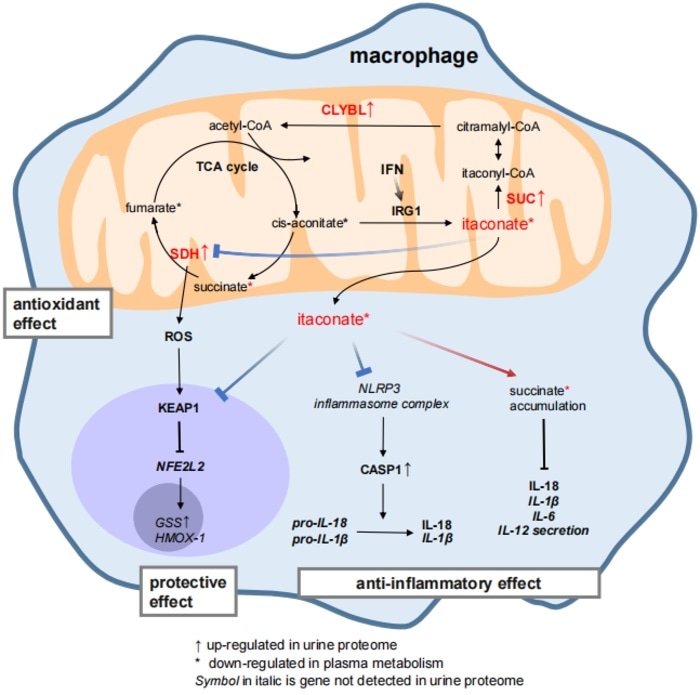Dr Jun Qin, a proteomics expert from the State Key Laboratory of Proteomics, Beijing Proteome Research Center, National Center for Protein Sciences (Beijing), Beijing Institute of Lifeomics, and Dr Zhongde Zhang from The Second Affiliated Hospital of Guangzhou University of Chinese Medicine, worked in the front line of compacting COVID-19 disease.

Overexpression of clybl could lead to the loss of upstream metabolites, thus resulting in the reduction of itaconate. itaconate can inhibit succinate dehydrogenase (sdh), activate nrf2/nfe2l2 via alkylation of keap1, and inhibit caspase-1-mediated cleavage of il-1β and il-18 to avoid excessive inflammation via the blockage of nlrp3 inflammasome activation. Image Credit: Science China Press
They wondered whether they could find clues for the disease at the start of the outbreak (February, 2020). They joined together to look at all kinds of proteins in urine, since urine can easily be acquired from living persons.
Scientists studied 317 urine proteomes from 86 COVID-19 and 55 pneumonia patients and 176 healthy controls using LC/MS-MS-based proteomics. They found 4,255 proteins in the urine, with immune and metabolic proteins being among the most significantly affected following SARS-CoV-2 infection.
Finding proteins in the anti-virus response pathway from the urine proteome, such as the up-regulated dsRNA detector DDX58/RIG-I, the virus response specific transcription regulator STAT1, and a group of ISG proteins, was both interesting and comforting. This shows that urine could be a window into what is going on inside the human body.
Scientists discovered CLYBL, an understudied protein that was not included in the generally used bioinformatics database for annotation, while sifting through the data. In the TCA cycle, CLYBL, a citramalyl-CoA lyase, catalyzes the transformation of itaconate to acetyl-CoA.
In COVID-19 patients, elevated CLYBL resulted in the consumption of the anti-inflammatory metabolite itaconate. As itaconate has been demonstrated to play a significant role in antioxidation, cellular preservation, and anti-inflammation, these findings have led to hypothesis that itaconate supplementation, in combination with CLYBL inhibition, could be a viable treatment option for COVID-19 patients.
The scientists discovered a number of proteins that may predict the change from mild to severe disease in COVID-19 development by comparing the proteomes of early-stage patients who eventually turned severe with those of patients who stayed moderate throughout progression of the disease.
Elevated levels of CD14, RBP4, SPON2, GMFG, SERPINA1, SERPINB6, and SERPINC1 in severe COVID-19 patients, as well as their biological roles, indicates that macrophage-induced inflammation and thrombolysis might play a vital role in the disease’s progression.
According to the current study, the urine proteome contains signals to what is going on inside the human body. It is a straightforward way to get biological samples from living humans in both physiological and pathological situations. Signaling pathways and potential therapeutic targets can be discovered by looking at the urine proteome.
The discovery of the endogenous immune-modulating metabolite itaconate as a viable therapy option for treating COVID-19 is particularly appropriate in this circumstance, as immune modulating medication is independent of mutating virus, such as Delta or Omicron.
Source:
Journal reference:
Liu, Y., et al. (2022) A urinary proteomic landscape of COVID-19 progression identifies signaling pathways and therapeutic options. Science China Life Sciences. doi.org/10.1007/s11427-021-2070-y.